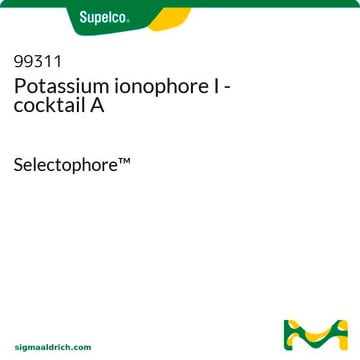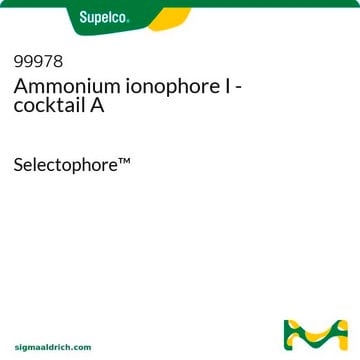95293
Hydrogen ionophore I - cocktail B
Selectophore™
Synonym(s):
H⁺ ionophore I - cocktail B
Sign Into View Organizational & Contract Pricing
All Photos(1)
About This Item
UNSPSC Code:
26111700
NACRES:
NB.61
Recommended Products
product line
Selectophore™
Quality Level
form
liquid
composition
Hydrogen ionophore I, 10.0 wt. % (95292)
2-Nitrophenyl octyl ether, 89.3 wt. % (73732)
Potassium tetrakis(4-chlorophenyl)borate, 0.7 wt. % (60591)
General description
Visit our Sensor Applications portal to learn more.
Application
Selected application examples
Packaging
Bottomless glass bottle. Contents are inside inserted fused cone.
Legal Information
Selectophore is a trademark of Merck KGaA, Darmstadt, Germany
related product
Signal Word
Warning
Hazard Statements
Precautionary Statements
Hazard Classifications
Aquatic Chronic 3 - Eye Irrit. 2 - Skin Irrit. 2
Storage Class Code
10 - Combustible liquids
WGK
WGK 3
Flash Point(F)
Not applicable
Flash Point(C)
Not applicable
Personal Protective Equipment
dust mask type N95 (US), Eyeshields, Gloves
Choose from one of the most recent versions:
Already Own This Product?
Find documentation for the products that you have recently purchased in the Document Library.
Gang Sa et al.
The New phytologist, 222(4), 1951-1964 (2019-02-14)
Salt stress is an important environmental cue impeding poplar nitrogen nutrition. Here, we characterized the impact of salinity on proton-driven nitrate fluxes in ectomycorrhizal roots and the importance of a Hartig net for nitrate uptake. We employed two Paxillus involutus
A hydrogen ion-selective liquid-membrane electrode based on tri-n-dodecylamine as neutral carrier
Schulthess, P.; et al.
Analytica Chimica Acta, 131, 111-116 (1981)
Neutral carrier based hydrogen ion selective microelectrode for extra- and intracellular studies.
D Ammann et al.
Analytical chemistry, 53(14), 2267-2269 (1981-12-01)
Robert D Hoffmann et al.
Nature communications, 11(1), 2395-2395 (2020-05-16)
Pollen tubes are highly polarized tip-growing cells that depend on cytosolic pH gradients for signaling and growth. Autoinhibited plasma membrane proton (H+) ATPases (AHAs) have been proposed to energize pollen tube growth and underlie cell polarity, however, mechanistic evidence for
Our team of scientists has experience in all areas of research including Life Science, Material Science, Chemical Synthesis, Chromatography, Analytical and many others.
Contact Technical Service









